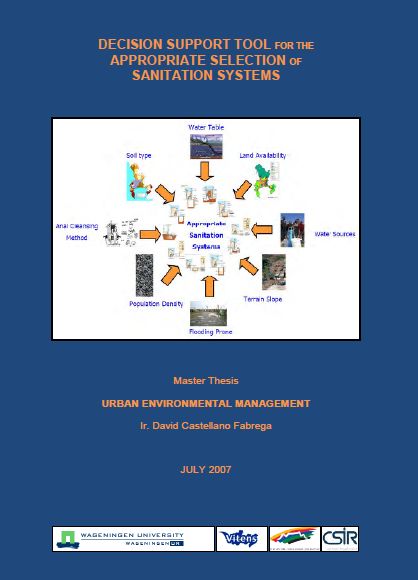Decision support tool for the appropriate selection of sanitation systems
Castellano Fabrega, D. (2007)

Published in: 2007
Publisher:
MSc Thesis, Urban and Environmental Management, Wageningen University, Wageningen, The Netherlands
Author:
Castellano Fabrega, D.
Uploaded by:
SuSanA secretariat
Partner profile:
common upload
7365 Views
383 Downloads
Location of library entry
Content - Summary
A research of existing decision support tools intending to facilitate the selection of suitable sanitation systems is presented. In order to assess the appropriateness of the five decision tools identified they were confronted with six evaluative criteria (user-friendliness, transparency, flexibility, versatility, interactivity and level of detail). The outcome of the evaluation revealed their weakness in flexibility and versatility dimensions. In this way the objective of this study was to develop a transparent, flexible and adaptable sanitation decision support tool while maintaining a high compliance with the other dimensions.
This tool aims to assist city officials, planners as well as communities in the decision process to select suitable sanitation solutions for each site specific layout. This decision support tool involves two main lines. The first one is the creation of a secure and easily upgradeable database to keep an improved and updated record of the settlements situation and services delivered. It includes the essential criteria for the assessment of sanitation options and a comprehensive set of relevant aspects with the purpose to maintain an accurate information system of the sites.
A Microsoft Access database is organized through a Visual Basic application in order to simplify and clarify the user interface as well as to protect the data entry in the system. On the other hand the database includes the features of a range of sanitation systems as well as their principal characteristics. In the model, based on an Excel screening tool, these characteristics are used as limitations for the later suitability assessment against the specific conditions of the selected settlement. The proposed indicators are founded on the basic physical and environmental aspects of the specific site. Moreover the user is provided with full flexibility and adaptability to decide, modify, add or remove any of the aspects and criteria involved in the sanitation decision support tool.
This tool was tested with data gathered in the informal settlements of Cape Town, South Africa. There are about 220 informal settlements spread all over its territory with an estimated population of about 900,000. Water supply and sanitation services in the informal areas are generally insufficient and poorly maintained. City officials have difficulties to find appropriate sanitation solutions that are consistent with the characteristics of the sites. According to the outcome of the sanitation decision support tool it was concluded that most of the settlements in Cape Town are lagging behind on any feasible sanitation solutions. The main barriers to the appropriateness of sanitation systems are the unsuitable location of the settlements affecting more than 40% of the sites, as well as high and very high housing densities counting about 55% of the investigated settlement.
The final conclusion of the pilot test is that the sanitation decision-support tool designed in this thesis illustrates maximum transparency through its clear interface and traceability of the outcome, demonstrates an improved flexibility by means of unrestricted selection of constraining criteria and values, and provides an enhanced versatility as a result of its easy upgradability and potential use in diverse environments.
Bibliographic information
Castellano Fabrega, D. (2007). Decision support tool for the appropriate selection of sanitation systems. MSc Thesis, Urban and Environmental Management, Wageningen University, Wageningen, The Netherlands
Filter tags
Case studies in other formats English Sanitation systems and technology options (WG4) Sub-Saharan Africa Urban informal settlements (slums)














